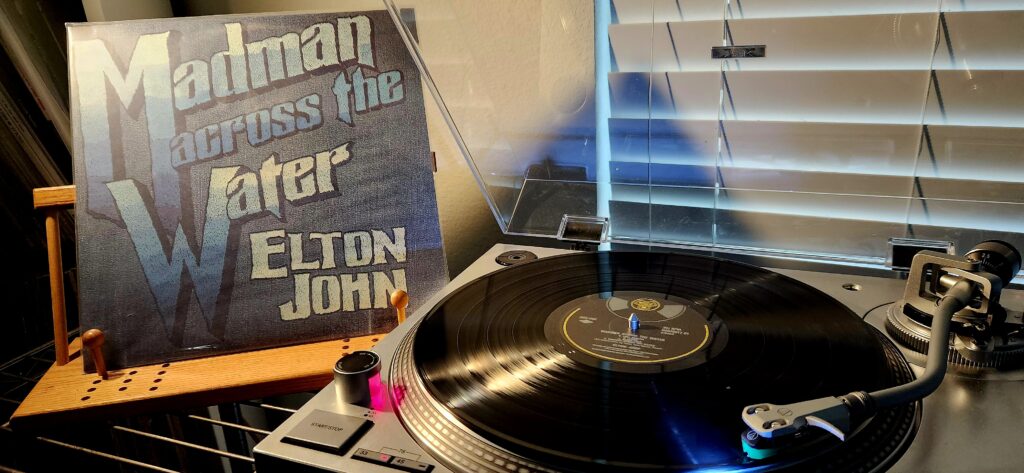
“Madman Across the Water,” Elton John’s fourth studio album, released in November 1971, stands as a defining moment in his early career and an emblematic piece of 1970s rock. The album marked a shift in John’s sound, exploring darker themes, lavish orchestrations, and emotionally resonant lyrics from longtime collaborator Bernie Taupin.
Recorded at Trident Studios in London, the album was produced by Gus Dudgeon, who also worked on John’s previous albums, helping to cultivate his classic sound. By 1971, Elton John was already gaining fame in the U.S., with his western-themed “Tumbleweed Connection” and 1970 debut resonating well with American audiences. But “Madman Across the Water” was something else. It brought an intensity and a grandiosity that felt almost cinematic, with sweeping arrangements that brought an edge to John’s folk-rock leanings.
The album features contributions from a host of musicians, most notably guitarist Davey Johnstone, who would become a staple in John’s band. Legendary session players like Caleb Quaye and Chris Spedding also contribute, alongside orchestration by Paul Buckmaster. who’s symphonic arrangements give the album a layered texture that underlines its moody, contemplative themes.
1. “Tiny Dancer”
Arguably the most well-known track on the album, “Tiny Dancer” is a powerful ode to the California lifestyle and the sense of freedom that Taupin observed during his time there. The song starts with a tender piano line that builds into a sweeping chorus, underscored by Buckmaster’s lush strings. Although it wasn’t an immediate hit, “Tiny Dancer” became iconic over the years, with its crescendoing arrangement and rich vocal harmonies showcasing John’s knack for balancing personal and anthemic elements.
2. “Levon”
With “Levon,” John and Taupin crafted a narrative about a man caught between family duty and individual desires. Its melancholic melody, driven by John’s poignant vocals and orchestration, hints at an allegorical tone, making “Levon” one of the more enigmatic tracks on the album. The song’s layered production, including an unforgettable piano riff and expressive strings, reinforces its introspective mood. Legend has it that Levon was named after the Band’s drummer Levon Helm, this legend is something Elton himself has denied. Over time, “Levon” has been celebrated as one of Elton’s finest works for its storytelling and musical depth.
3. “Madman Across the Water”
The title track is brooding, dark, and intense, embodying the album’s overarching themes of alienation and paranoia. The lyrics evoke a sense of political and social disillusionment, hinting at the tensions of the time (often interpreted as a critique of American politics). Musically, it’s one of the most dramatic songs on the album, with electric guitar interwoven with piano and orchestral backing. It stands out for its atmospheric, almost ominous tone, and John’s vocal performance is notably raw and impassioned.
4. “Indian Sunset”
In this track, Taupin draws on Native American themes, weaving a narrative about the struggles of indigenous people in the face of oppression. The song builds from a quiet, folk-like beginning into a powerful, symphonic climax, with John delivering one of his most emotionally charged performances. Although it’s rarely played live, “Indian Sunset” remains a standout on the album for its ambitious storytelling and evocative arrangement.
5. “Goodbye”
The album closes with “Goodbye,” a short but beautiful track that provides a sense of melancholic resolution. In contrast to the grandiosity of the preceding songs, this piece is understated and gentle, leaving listeners with a haunting sense of longing. Though brief, “Goodbye” captures the reflective spirit of the album as a whole.
Lyrically, “Madman Across the Water” explores complex themes of isolation, identity, and disillusionment. The album feels introspective and emotionally weighty, a departure from the pop-rock sensibility of John’s earlier works. Taupin’s lyrics are among his most mature and intricate, often avoiding direct interpretations and instead providing glimpses into characters’ inner lives and societal commentary.
Musically, the album represents an evolution in John’s sound. The orchestral arrangements by Paul Buckmaster create a lush, sometimes dark soundscape that gives the album a dramatic, almost theatrical quality. John’s vocals are also notably more expressive on this record, ranging from tender to anguished, complementing Taupin’s introspective lyrics.
Upon its release, “Madman Across the Water” received mixed reviews from critics, who were divided on its ambitious orchestration and dark tone. However, it has since gained a reputation as one of John’s finest albums, appreciated for its artistic depth and cohesive sound. Over time, the album has been re-evaluated as a landmark in John’s career, with songs like “Tiny Dancer” and “Levon” becoming mainstays of his catalog.
In recent years, “Madman Across the Water” has been hailed as a classic, a testament to John and Taupin’s ability to craft songs that are both deeply personal and universally resonant. The album showcases Elton John not only as a pop singer but as a serious musician capable of pushing artistic boundaries. It’s a record that rewards repeated listening, offering new insights with each play.
“Madman Across the Water” is a complex, richly textured album that marks a high point in Elton John’s early career. While it may not have the instant appeal of some of his later hits, it stands as a testament to his artistry and his willingness to explore challenging themes. The album’s mix of orchestral grandeur and personal introspection makes it a unique and lasting work, and it continues to resonate with fans more than 50 years after its release. For anyone interested in John’s evolution as an artist, “Madman Across the Water” is an essential listen.
